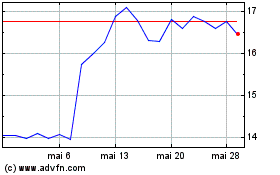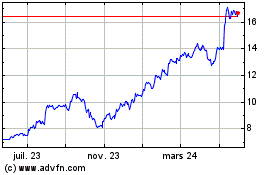King of Generics Pushes Into Biotech Drugs
13 Février 2019 - 2:54PM
Dow Jones News
By Denise Roland
The world's largest maker of generic drugs is looking for growth
in an unlikely place: high-price biotech medicines.
Teva Pharmaceutical Industries Ltd., which makes more than one
in 10 drugs taken in the U.S., has been battered in recent years by
slumping generics prices, while grappling with heavy debts. That
has forced it to cut thousands of jobs and shut research
facilities. Now it is turning to biotech drugs to revive its
fortunes.
"We figured out a strategy where we'd continue to be leaders in
generics but really focus our R&D on innovative biologics and
biosimilars," new Chief Executive Kåre Schultz said in an
interview. "That's what we're working hard on right now."
Teva's full-year results Wednesday underscore the scale of the
challenge he faces. The company reported a 16% slide in revenue to
$18.9 billion for 2018, with adjusted earnings per share -- which
strips out one-time items -- down 27% at $2.92. Teva said it
expected revenue to decline further this year, forecasting sales of
$17 billion to $17.4 billion.
The lower-than-expected guidance and weak sales for one of its
newer drugs sent shares down more than 12% on the Tel Aviv Stock
Exchange.
Biotech, or biologic, drugs are made using living cells in a
process that resembles brewing. They are much more complex than
pill-form medicines and typically command higher prices because
they target specialty diseases like cancer and rheumatological
conditions.
The Israel-based company already sells some biologic drugs, but
they make up a small portion of revenue. Mr. Schultz's ambition is
for around half of the company's sales to come from biologics in
the long run.
Teva doesn't have the financial firepower to buy new drug
prospects and has had to cut its research budget. So Mr. Schultz
has halved the size of Teva's research pipeline to focus purely on
biologic drugs. It now has 25 drugs in development, mostly at an
early stage.
The 57-year-old industry veteran zeroed in on biologics after
discovering that Teva already had pockets of expertise in the area
but without focus. "The R&D strategy was really all over the
place," said Mr. Schultz, who joined Teva just over a year ago from
Denmark's Lundbeck A/S.
In doing so, he is tapping into a broader trend. Between 2006
and 2016, biologics' share of the pharmaceutical market rose from
16% to 25%, according to IQVIA, a health-care data company.
With its push into biologics, Teva is doubling down on what has
long been a lucrative sideline for the company: original, branded
drugs. For years, Teva counted on multiple sclerosis drug Copaxone
to boost profits, but sales are now dropping sharply as it faces
competition from cheaper copies.
That sideline started as a lucky break. In 1987, then-CEO Eli
Hurvitz agreed to help out a friend who was working on a new drug
at Israel's Weizmann Institute by bankrolling the clinical trials
needed to win regulatory approval. In return, Teva got the rights
to sell the drug. According to company lore, Mr. Hurvitz justified
the risky investment by carrying around a piece of paper promising
to resign if the drug failed.
Copaxone was launched 10 years later and has since generated
nearly $50 billion for Teva. At its peak in 2013, it accounted for
a fifth of Teva's sales.
Teva continued to develop innovative drugs, but its efforts
didn't yield enough to replace the revenue lost when cheaper copies
of the blockbuster emerged in late 2017.
Copaxone's decline compounded an already-dire situation for
Teva. The company was grappling with a huge debt pile and a price
war in the U.S. generic-drug market, sparked by wave of
consolidation among pharmacy chains and a sudden influx of new
competitors. Mr. Schultz's predecessor, Erez Vigodman, departed in
February 2017 and the company didn't have a permanent chief
executive for nearly nine months.
Weeks after joining the company, Mr. Schultz launched a
cost-cutting plan that involved axing a quarter of Teva's staff,
around 14,000 people, shutting around 20 of the company's roughly
80 factories and several research centers.
Mr. Schultz says the turnaround is making progress. Cost cuts
are ahead of schedule, debt has been narrowed and he expects
revenue to start edging up in 2020 as the generics business starts
to grow again. Some newer branded drugs, like migraine-prevention
treatment Ajovy and Austedo for Huntington's and other movement
disorders, could also start to gain momentum.
Despite his focus on biologics, Mr. Schultz wants Teva to remain
a dominant player in generic drugs, too. He believes the price
decline, which has halved the value of the U.S. generics market
over the past five years, is bottoming out.
And the new push may also help boost Teva in the area it is best
known for: Some of the research projects are biosimilars,
essentially generics for biologic drugs.
Write to Denise Roland at Denise.Roland@wsj.com
(END) Dow Jones Newswires
February 13, 2019 08:39 ET (13:39 GMT)
Copyright (c) 2019 Dow Jones & Company, Inc.
Teva Pharmaceutical Indu... (NYSE:TEVA)
Graphique Historique de l'Action
De Juin 2024 à Juil 2024

Teva Pharmaceutical Indu... (NYSE:TEVA)
Graphique Historique de l'Action
De Juil 2023 à Juil 2024
